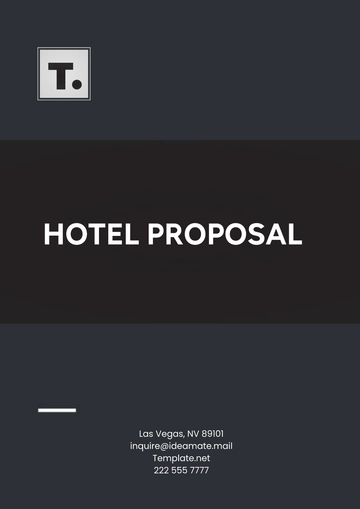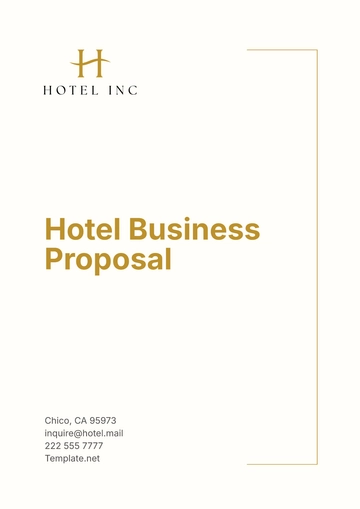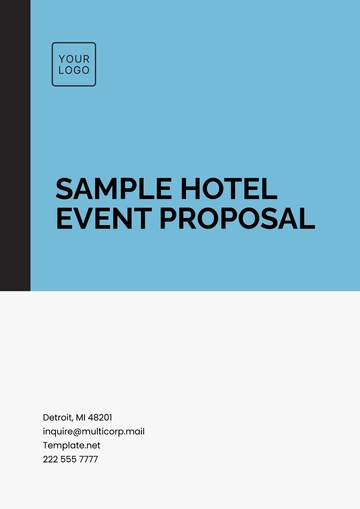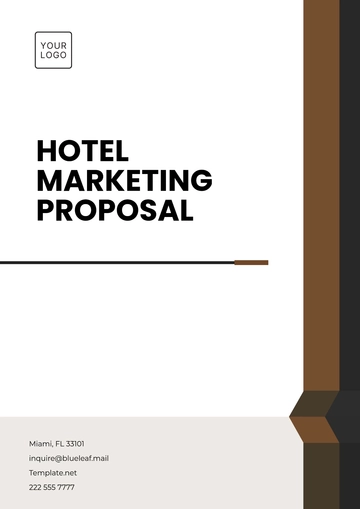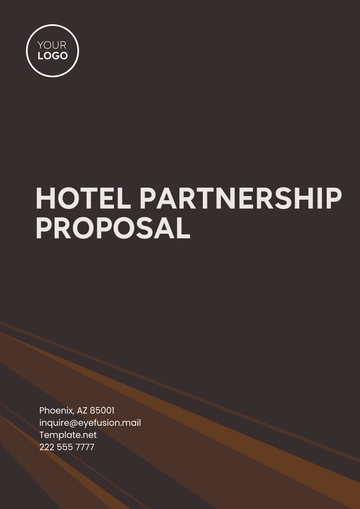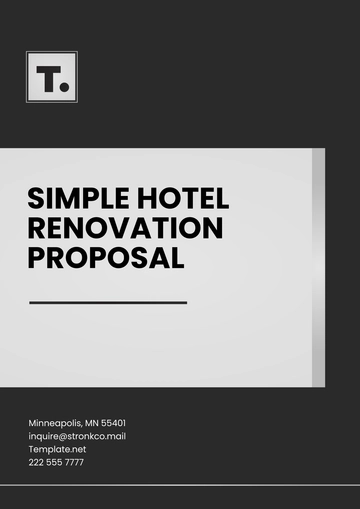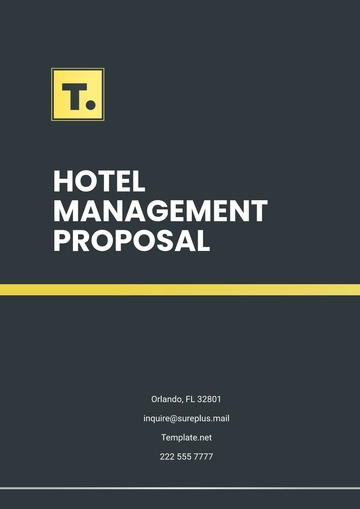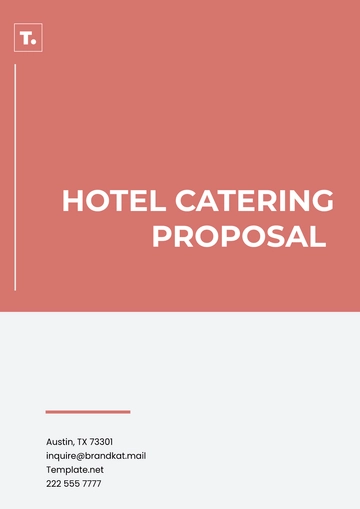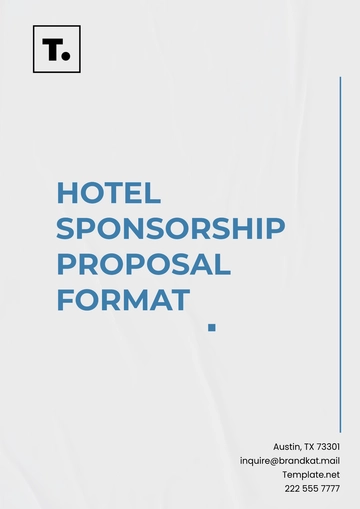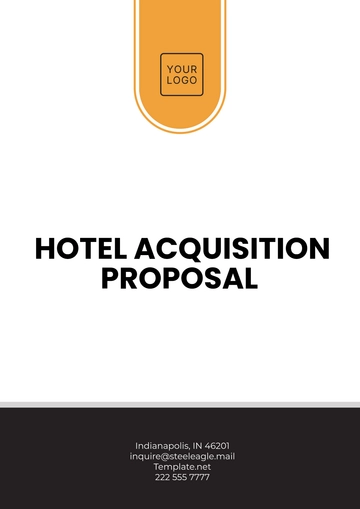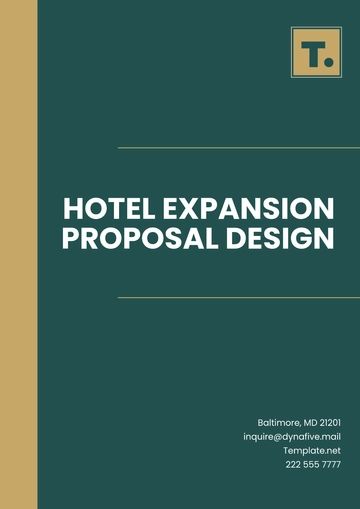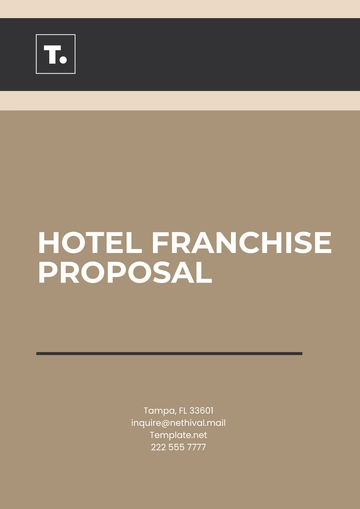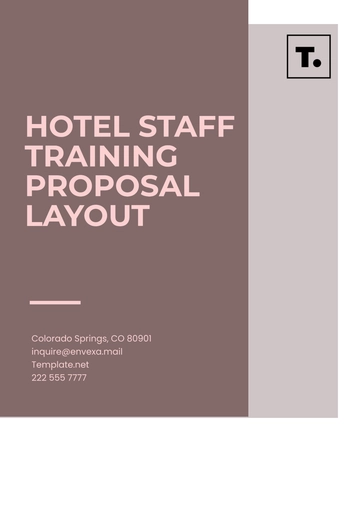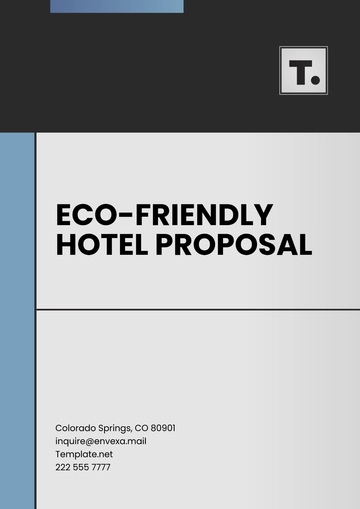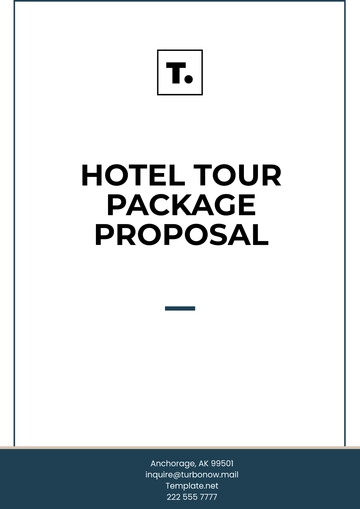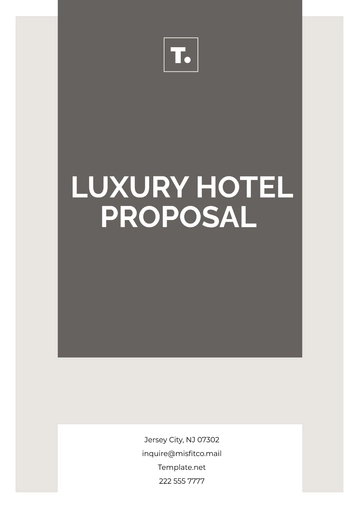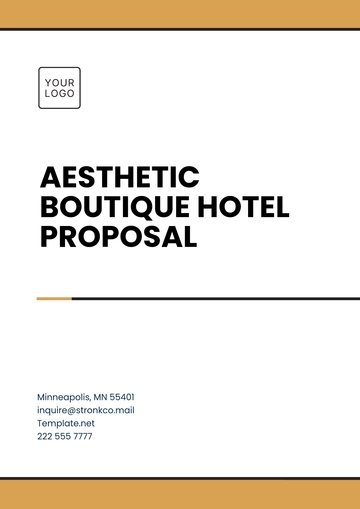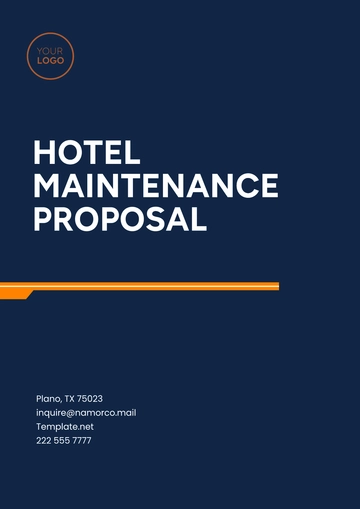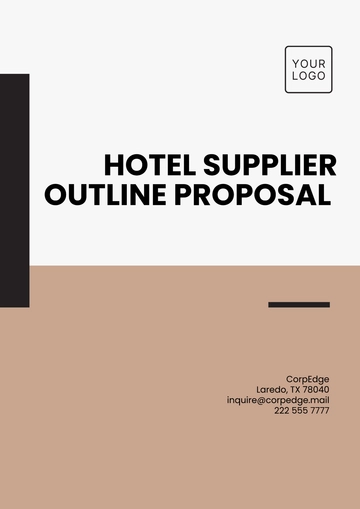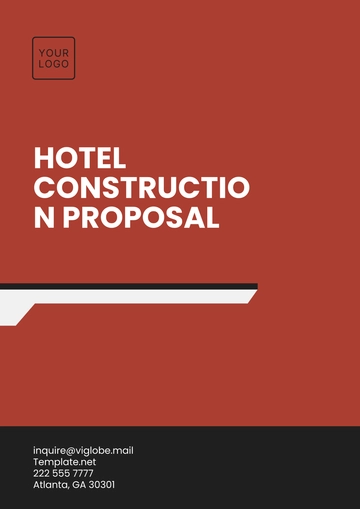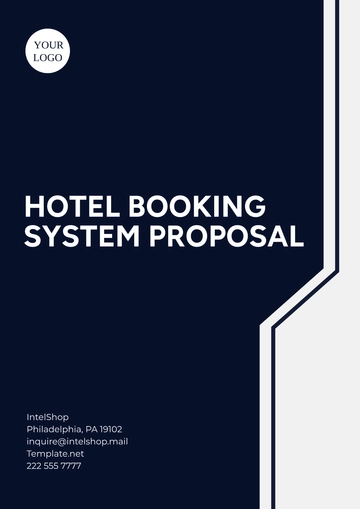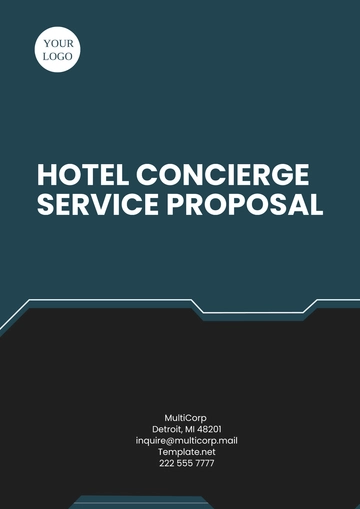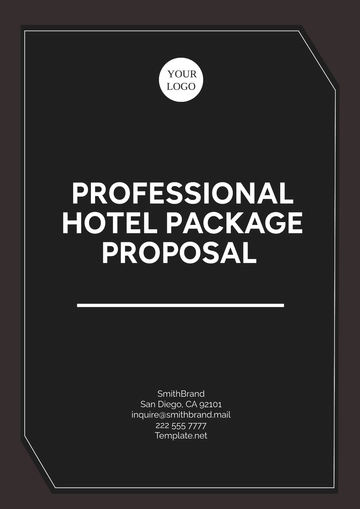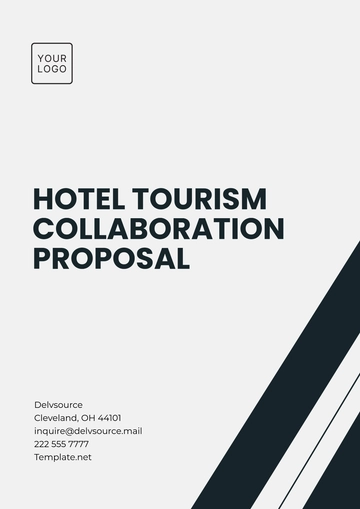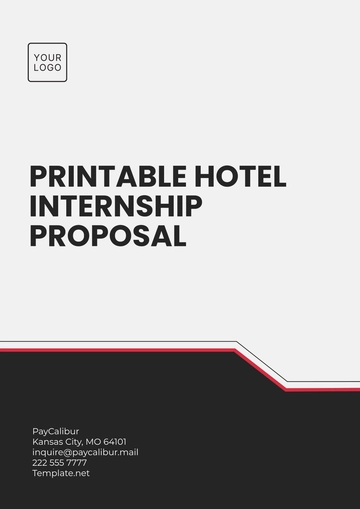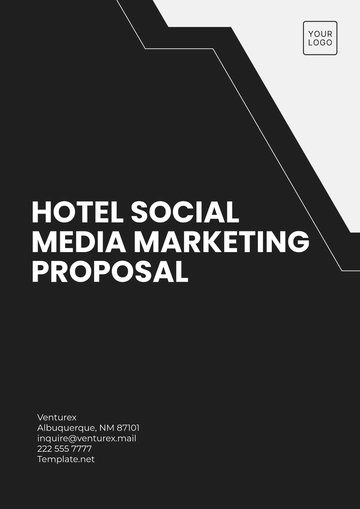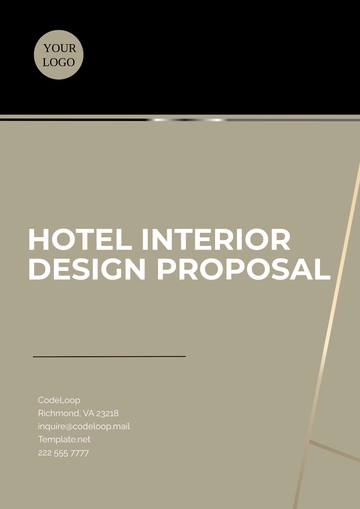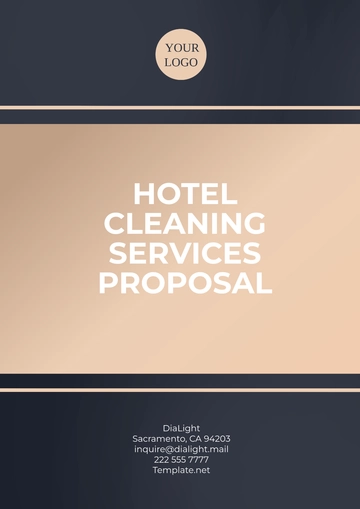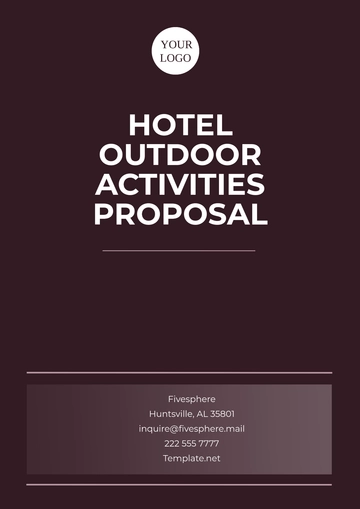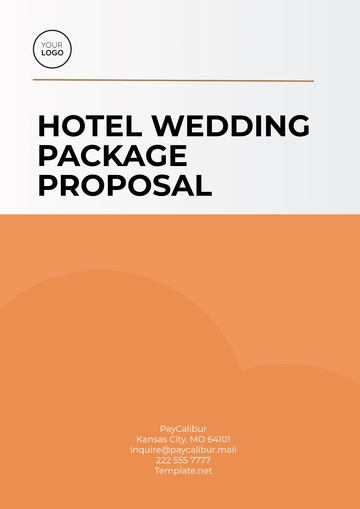Free Hotel Budget Proposal
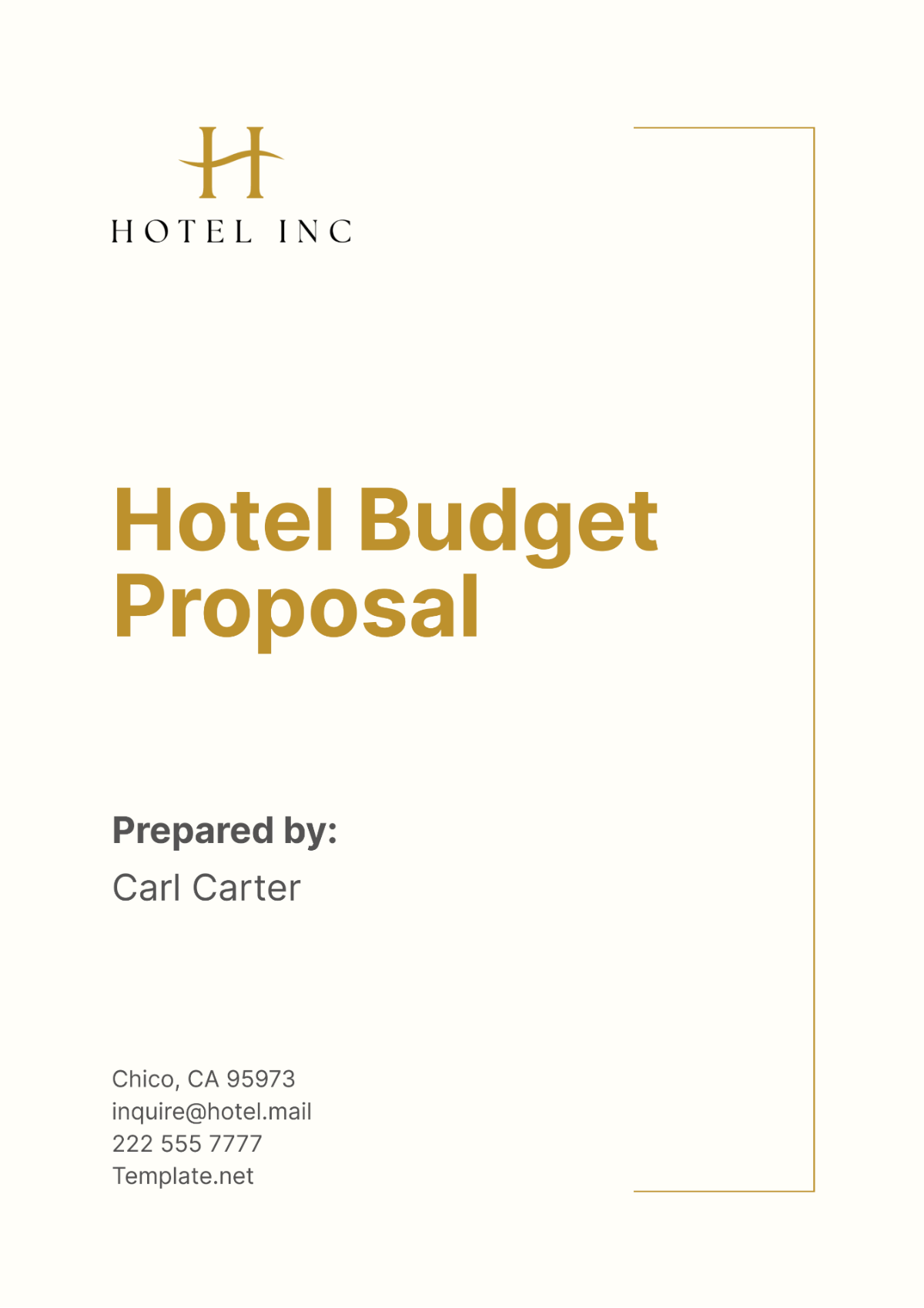
I. Executive Summary
The Budget Proposal for [Your Company Name] outlines the comprehensive financial plan for establishing a new luxury hotel in 2053. This proposal covers all essential aspects, from site acquisition to operational costs, ensuring a successful launch and sustained profitability. The total budget required for this project is $25,350,000, which has been meticulously calculated to cover every facet of the hotel’s development and operation.
Our timeline for this project spans over 2 years, starting with the acquisition and preparation of the site, followed by construction, staffing, and pre-opening marketing. By the end of this period, the hotel will be fully operational, providing guests with an exceptional experience.
Investing in this hotel project is expected to yield significant returns, both in terms of financial profitability and brand reputation. With a solid financial foundation and detailed planning, [Your Company Name] is poised to set a new standard in the hospitality industry.
II. Site Acquisition and Preparation
A. Site Acquisition
The following table outlines the estimated costs for acquiring the site and obtaining necessary permits:
Item | Estimated Cost |
|---|---|
Purchase of Land | $3,500,000 |
Legal Fees and Permits | $500,000 |
Environmental Assessments | $250,000 |
Total | $4,250,000 |
Purchase of Land ($3,500,000): This cost reflects the acquisition of a prime location suitable for the hotel. A well-located site ensures accessibility and attractiveness to potential guests.
Legal Fees and Permits ($500,000): Covering all legal aspects and necessary permits for construction. Proper legal documentation and permits are crucial to avoid future legal issues.
Environmental Assessments ($250,000): Conducting thorough environmental assessments to ensure the site meets all regulatory requirements. This step is essential for sustainable development.
Total ($4,250,000): The total cost for site acquisition and preparation, ensuring the project begins on a solid foundation.
Investing in site acquisition and preparation is a critical first step, laying the groundwork for the entire project. Securing a prime location, adhering to legal requirements, and ensuring environmental compliance are foundational to the hotel’s success and sustainability.
B. Site Preparation
The following table details the estimated costs for preparing the site for construction:
Item | Estimated Cost |
|---|---|
Land Clearing | $100,000 |
Excavation and Grading | $50,000 |
Utility Connections | $50,000 |
Total | $200,000 |
Land Clearing ($100,000): Removing existing structures and vegetation to prepare the site for construction. Proper land clearing ensures a smooth start to the construction phase.
Excavation and Grading ($50,000): Leveling the land and preparing it for the building foundation. Accurate grading is essential for structural integrity and drainage.
Utility Connections ($50,000): Establishing connections to essential utilities such as water, electricity, and sewage. Ensuring utility access is crucial for construction and future operations.
Total ($200,000): The total cost for site preparation, ensuring the site is ready for the construction phase.
Site preparation is essential for creating a build-ready environment. Clearing, grading, and connecting utilities are fundamental steps that ensure the construction process proceeds without delays or complications.
III. Construction Costs
A. Building Construction
The following chart and table outline the estimated costs for constructing the project:
Item | Estimated Cost |
|---|---|
Foundation Work | $2,000,000 |
Structural Construction | $6,000,000 |
Interior Finishing | $4,000,000 |
Landscaping | $1,000,000 |
Total | $13,000,000 |
Foundation Work ($2,000,000): Laying a strong foundation is critical for the structural stability of the hotel. This cost includes materials and labor for creating a durable base.
Structural Construction ($6,000,000): Building the main structure, including walls, roofs, and essential frameworks. This phase is the most significant and cost-intensive part of construction.
Interior Finishing ($4,000,000): Completing the interiors with high-quality materials and finishes. Aesthetic and functional interiors enhance guest experience and satisfaction.
Landscaping ($1,000,000): Creating appealing outdoor spaces, including gardens and pathways. Well-designed landscaping contributes to the overall guest experience and hotel ambiance.
Total ($13,000,000): The total cost for constructing the hotel building, ensuring a high-quality and attractive establishment.
Investing in quality construction ensures the hotel is built to last and meets high standards of safety and comfort. From the foundation to the final interior touches, every aspect contributes to creating a desirable destination for guests.
B. Interior Design and Furnishing
The following table details the estimated costs for interior design and furnishing:
Item | Estimated Cost |
|---|---|
Furniture | $500,000 |
Fixtures and Equipment | $300,000 |
Decor and Artworks | $200,000 |
Total | $1,000,000 |
Furniture ($500,000): Procuring high-quality furniture for guest rooms, common areas, and dining spaces. Comfortable and stylish furniture enhances the guest experience.
Fixtures and Equipment ($300,000): Installing necessary fixtures and equipment such as lighting, plumbing, and HVAC systems. These elements are essential for functionality and guest comfort.
Decor and Artworks ($200,000): Adding decorative elements and artworks to create a unique and appealing ambiance. Thoughtfully chosen decor can significantly enhance the hotel's aesthetic appeal.
Total ($1,000,000): The total cost for interior design and furnishing, ensuring a welcoming and comfortable environment for guests.
Investing in interior design and furnishing is crucial for creating a pleasant and inviting atmosphere. High-quality furniture, fixtures, and decor not only enhance the guest experience but also contribute to the hotel's overall brand and reputation.
IV. Staffing Costs
A. Recruitment and Training
The following table outlines the estimated costs for recruiting and training staff:
Item | Estimated Cost |
|---|---|
Recruitment | $150,000 |
Training Programs | $200,000 |
Orientation and Onboarding | $50,000 |
Total | $400,000 |
Recruitment ($150,000): Costs associated with hiring qualified staff, including advertising, interviews, and recruitment agency fees. Effective recruitment ensures the hotel attracts skilled personnel.
Training Programs ($200,000): Comprehensive training programs to equip staff with the necessary skills and knowledge. Well-trained staff are crucial for providing excellent service and enhancing guest satisfaction.
Orientation and Onboarding ($50,000): Introducing new hires to the hotel’s culture, policies, and procedures. Proper onboarding ensures staff are well-prepared and integrated into the team.
Total ($400,000): The total cost for recruitment and training, ensuring the hotel has a skilled and well-prepared workforce.
Investing in recruitment and training is essential for building a competent and motivated team. Well-trained staff are key to delivering exceptional guest experiences and maintaining high operational standards.
B. Salaries and Benefits
The following table details the estimated annual costs for salaries and benefits:
Item | Estimated Cost |
|---|---|
Salaries | $1,500,000 |
Benefits | $350,000 |
Incentives and Bonuses | $100,000 |
Total | $1,950,000 |
Salaries ($1,500,000): Annual salaries for all hotel staff, from management to housekeeping. Competitive salaries are necessary to attract and retain talented employees.
Benefits ($350,000): Health insurance, retirement plans, and other employee benefits. Providing comprehensive benefits supports employee well-being and job satisfaction.
Incentives and Bonuses ($100,000): Performance-based incentives and bonuses to reward and motivate staff. Incentives encourage high performance and contribute to a positive work environment.
Total ($1,950,000): The total annual cost for salaries and benefits, ensuring the hotel maintains a motivated and well-compensated workforce.
Competitive salaries and benefits are crucial for attracting and retaining skilled staff. By offering attractive compensation packages, the hotel can ensure high levels of employee satisfaction and performance.
V. Marketing and Advertising
A. Pre-Opening Marketing
The following chart and table outline the estimated costs for pre-opening marketing efforts:
Item | Estimated Cost |
|---|---|
Digital Marketing | $200,000 |
Print Advertising | $150,000 |
Social Media Campaigns | $100,000 |
Influencer Partnerships | $50,000 |
Promotional Events | $250,000 |
Total | $750,000 |
Digital Marketing ($200,000): Online advertising, SEO, and content marketing to create awareness and attract potential guests. Digital marketing is crucial for reaching a broad audience.
Print Advertising ($150,000): Traditional advertising in magazines, newspapers, and travel brochures. Print advertising targets specific demographics and complements digital efforts.
Social Media Campaigns ($100,000): Engaging with potential guests on platforms like Instagram, Facebook, and Twitter. Social media campaigns build brand awareness and foster engagement.
Influencer Partnerships ($50,000): Collaborating with influencers to promote the hotel to their followers. Influencer partnerships can significantly boost visibility and credibility.
Promotional Events ($250,000): Hosting events to showcase the hotel and attract media coverage. Promotional events generate buzz and provide firsthand experiences of the hotel’s offerings.
Total ($750,000): The total cost for pre-opening marketing, ensuring a strong launch and initial guest engagement.
Pre-opening marketing is essential for creating excitement and awareness about the new hotel. Effective marketing strategies will attract guests and establish the hotel’s brand presence in the competitive hospitality market.
B. Ongoing Advertising
The following table details the estimated annual costs for ongoing advertising:
Item | Estimated Cost |
|---|---|
Digital Marketing | $200,000 |
Print Advertising | $150,000 |
Social Media Campaigns | $100,000 |
Influencer Partnerships | $50,000 |
Total | $500,000 |
Digital Marketing ($200,000): Continuing online advertising efforts to maintain visibility and attract new guests. Consistent digital marketing is crucial for sustained engagement.
Print Advertising ($150,000): Ongoing advertisements in print media to reach traditional audiences. Print advertising supports the hotel’s presence in targeted markets.
Social Media Campaigns ($100,000): Regularly engaging with audiences on social media platforms. Consistent social media activity fosters community and loyalty.
Influencer Partnerships ($50,000): Maintaining collaborations with influencers to keep the hotel in the public eye. Ongoing partnerships ensure continued exposure and relevance.
Total ($500,000): The total annual cost for ongoing advertising, ensuring the hotel remains prominent in the market.
Ongoing advertising is necessary for maintaining brand visibility and attracting a steady stream of guests. By investing in continuous marketing efforts, the hotel can sustain its competitive edge and ensure long-term success.
VI. Operational Costs
A. Utilities and Maintenance
The following table outlines the estimated annual costs for utilities and maintenance:
Item | Estimated Cost |
|---|---|
Utilities | $500,000 |
Routine Maintenance | $200,000 |
Major Repairs and Upgrades | $100,000 |
Total | $800,000 |
Utilities ($500,000): Costs for water, electricity, gas, and other essential services. Reliable utility services are fundamental for hotel operations.
Routine Maintenance ($200,000): Regular upkeep of the hotel’s facilities and equipment. Routine maintenance ensures everything is functioning optimally and safely.
Major Repairs and Upgrades ($100,000): Budget for significant repairs and updates to the hotel’s infrastructure. Major repairs and upgrades are necessary to maintain high standards and address wear and tear.
Total ($800,000): The total annual cost for utilities and maintenance, ensuring smooth and efficient hotel operations.
Investing in utilities and maintenance is critical for the hotel’s day-to-day operations. Proper maintenance and reliable utility services are essential for providing a comfortable and safe environment for guests.
B. Consumables and Supplies
The following table details the estimated annual costs for consumables and supplies:
Item | Estimated Cost |
|---|---|
Cleaning Supplies | $200,000 |
Guest Amenities | $100,000 |
Office Supplies | $25,000 |
Total | $325,000 |
Cleaning Supplies ($200,000): Purchasing cleaning products and equipment necessary for maintaining hygiene and cleanliness. High-quality cleaning supplies are vital for guest satisfaction and health.
Guest Amenities ($100,000): Providing toiletries, refreshments, and other in-room amenities for guests. Thoughtful guest amenities enhance the overall experience and encourage repeat visits.
Office Supplies ($25,000): Procuring necessary supplies for administrative tasks and operations. Adequate office supplies support efficient management and coordination.
Total ($325,000): The total annual cost for consumables and supplies, ensuring the hotel runs smoothly and meets guest expectations.
Ensuring a steady supply of consumables and amenities is essential for the hotel’s daily operations. Quality supplies contribute to maintaining high standards of cleanliness and guest satisfaction, which are crucial for the hotel’s reputation and success.
VII. Technology and Infrastructure
A. IT Infrastructure
The following table outlines the estimated costs for establishing IT infrastructure:
Item | Estimated Cost |
|---|---|
Hardware and Servers | $300,000 |
Networking Equipment | $150,000 |
Software and Licensing | $100,000 |
Total | $550,000 |
Hardware and Servers ($300,000): Procuring necessary hardware and servers to support the hotel’s IT needs. Reliable hardware is crucial for efficient operations and data management.
Networking Equipment ($150,000): Installing networking equipment to ensure seamless connectivity throughout the hotel. Strong networking infrastructure supports guest services and internal operations.
Software and Licensing ($100,000): Acquiring software and necessary licenses for operational and management tasks. Up-to-date software ensures efficient and secure operations.
Total ($550,000): The total cost for establishing IT infrastructure, ensuring the hotel’s technological readiness.
Investing in robust IT infrastructure is essential for modern hotel operations. Reliable hardware, strong networking, and efficient software support all aspects of hotel management and enhance guest experiences.
B. Smart Room Features
The following table details the estimated costs for implementing smart room features:
Item | Estimated Cost |
|---|---|
Smart Lighting | $100,000 |
Smart Thermostats | $75,000 |
Voice-Activated Assistants | $50,000 |
Entertainment Systems | $50,000 |
Total | $275,000 |
Smart Lighting ($100,000): Installing smart lighting systems that can be controlled remotely and adjusted for energy efficiency. Smart lighting enhances guest comfort and reduces energy consumption.
Smart Thermostats ($75,000): Implementing smart thermostats to provide customizable climate control. Smart thermostats improve energy efficiency and guest satisfaction.
Voice-Activated Assistants ($50,000): Equipping rooms with voice-activated assistants for convenience and enhanced guest experience. Voice assistants offer personalized services and improve guest interaction.
Entertainment Systems ($50,000): Upgrading in-room entertainment systems to include smart TVs and streaming options. Modern entertainment systems enhance the guest experience and satisfaction.
Total ($275,000): The total cost for implementing smart room features, ensuring a modern and technologically advanced guest experience.
Incorporating smart room features enhances the hotel’s appeal by offering guests modern conveniences and personalized services. These features not only improve guest comfort but also contribute to energy efficiency and operational cost savings.
VIII. Contingency and Risk Management
A. Contingency Planning
The following table outlines the estimated costs for contingency planning:
Item | Estimated Cost |
|---|---|
Emergency Fund | $500,000 |
Insurance Coverage | $200,000 |
Crisis Management Training | $100,000 |
Total | $800,000 |
Emergency Fund ($500,000): Establishing a reserve fund to cover unexpected expenses. An emergency fund provides financial security and ensures operations can continue smoothly during unforeseen events.
Insurance Coverage ($200,000): Covering various insurance policies such as property, liability, and business interruption insurance. Comprehensive insurance coverage protects the hotel from financial losses due to unforeseen incidents.
Crisis Management Training ($100,000): Training staff in crisis management and emergency response procedures. Proper training equips staff to handle emergencies efficiently and minimize impact.
Total ($800,000): This total represents the investment in contingency planning, ensuring the hotel is prepared for potential risks and emergencies.
Investing in contingency planning and risk management is crucial for ensuring the hotel’s resilience and ability to handle unexpected events. By proactively identifying risks and preparing for emergencies, we can protect the hotel’s assets, maintain operations during crises, and safeguard guest and staff well-being.
B. Risk Mitigation Measures
The following table outlines the estimated costs for risk mitigation measures:
Item | Estimated Cost |
|---|---|
Security Upgrades | $100,000 |
Backup Power Systems | $200,000 |
Cybersecurity Measures | $150,000 |
Health and Safety Protocols | $100,000 |
Total | $550,000 |
Security Upgrades ($100,000): Enhancing physical security systems such as surveillance cameras and access control. Improved security measures protect guests, staff, and property.
Backup Power Systems ($200,000): Installing backup generators and power systems to ensure continuous operations during power outages. Reliable backup power is essential for maintaining services and guest comfort.
Cybersecurity Measures ($150,000): Implementing advanced cybersecurity protocols to protect sensitive data and prevent breaches. Strong cybersecurity is crucial for safeguarding guest information and hotel operations.
Health and Safety Protocols ($100,000): Establishing health and safety protocols to ensure a safe environment for guests and staff. Effective health and safety measures are vital for maintaining a secure and comfortable hotel.
Total ($550,000): The total cost for risk mitigation measures, ensuring comprehensive protection for the hotel.
Implementing risk mitigation measures is essential for protecting the hotel’s assets and ensuring the safety and security of guests and staff. By addressing potential vulnerabilities proactively, we can minimize risks and enhance the overall resilience of the hotel.
IX. Total Budget
The following chart and table summarize the total estimated costs for the project:
Category | Estimated Cost |
|---|---|
Site Acquisition and Preparation | $4,450,000 |
Construction Costs | $14,000,000 |
Staffing Costs | $2,350,000 |
Marketing and Advertising | $1,250,000 |
Operational Costs | $1,125,000 |
Technology and Infrastructure | $825,000 |
Contingency and Risk Management | $1,350,000 |
Grand Total | $25,350,000 |
A. Site Acquisition and Preparation
This includes all expenses related to acquiring and preparing the site for construction. It ensures a suitable location and a build-ready environment, which are foundational to the hotel’s success.
B. Construction Costs
This is the most significant portion of the budget, covering the actual building of the hotel and its amenities. Quality construction is crucial for long-term durability and guest satisfaction.
C. Staffing Costs
This covers recruitment, training, salaries, and benefits. A well-compensated and trained staff is essential for providing excellent service and maintaining high operational standards.
D. Marketing and Advertising
This budget ensures robust marketing efforts to attract guests and establish the hotel’s brand. Effective marketing is vital for a successful launch and ongoing guest engagement.
E. Operational Costs
This includes utilities, maintenance, and supplies necessary for daily operations. Reliable operations are fundamental for guest comfort and satisfaction.
F. Technology and Infrastructure
This covers IT infrastructure and smart room features. Advanced technology enhances operational efficiency and guest experiences.
G. Contingency and Risk Management
This budget ensures the hotel is prepared for emergencies and potential risks. Comprehensive risk management is crucial for protecting the hotel’s assets and operations.
H. Grand Total
The comprehensive total budget of $25,350,000 ensures that all aspects of the hotel project are adequately funded. This strategic allocation of resources supports a successful launch and sustainable operations, positioning the hotel for long-term success in the competitive hospitality industry.
X. Conclusion
The proposed budget of $25,350,000 for [Your Company Name]’s in 2053 represents a comprehensive and strategic investment in creating a luxury establishment. The budget has been meticulously planned to cover all essential aspects, from site acquisition and construction to staffing, marketing, operations, and risk management.
With this detailed financial plan, [Your Company Name] is well-prepared to embark on this ambitious project, ensuring a successful launch and sustained profitability. By investing in quality construction, skilled staff, effective marketing, and robust risk management, the hotel is poised to set a new standard in the hospitality industry.
- 100% Customizable, free editor
- Access 1 Million+ Templates, photo’s & graphics
- Download or share as a template
- Click and replace photos, graphics, text, backgrounds
- Resize, crop, AI write & more
- Access advanced editor
Streamline budget planning with our customizable Hotel Budget Proposal Template on Template.net! This editable resource simplifies the creation of detailed budget proposals, allowing you to allocate resources effectively. Customize budget categories to align with your hotel's financial goals, and utilize the AI Editor Tool now to ensure precision with ease!
You may also like
- Business Proposal
- Research Proposal
- Proposal Request
- Project Proposal
- Grant Proposal
- Photography Proposal
- Job Proposal
- Budget Proposal
- Marketing Proposal
- Branding Proposal
- Advertising Proposal
- Sales Proposal
- Startup Proposal
- Event Proposal
- Creative Proposal
- Restaurant Proposal
- Blank Proposal
- One Page Proposal
- Proposal Report
- IT Proposal
- Non Profit Proposal
- Training Proposal
- Construction Proposal
- School Proposal
- Cleaning Proposal
- Contract Proposal
- HR Proposal
- Travel Agency Proposal
- Small Business Proposal
- Investment Proposal
- Bid Proposal
- Retail Business Proposal
- Sponsorship Proposal
- Academic Proposal
- Partnership Proposal
- Work Proposal
- Agency Proposal
- University Proposal
- Accounting Proposal
- Real Estate Proposal
- Hotel Proposal
- Product Proposal
- Advertising Agency Proposal
- Development Proposal
- Loan Proposal
- Website Proposal
- Nursing Home Proposal
- Financial Proposal
- Salon Proposal
- Freelancer Proposal
- Funding Proposal
- Work from Home Proposal
- Company Proposal
- Consulting Proposal
- Educational Proposal
- Construction Bid Proposal
- Interior Design Proposal
- New Product Proposal
- Sports Proposal
- Corporate Proposal
- Food Proposal
- Property Proposal
- Maintenance Proposal
- Purchase Proposal
- Rental Proposal
- Recruitment Proposal
- Social Media Proposal
- Travel Proposal
- Trip Proposal
- Software Proposal
- Conference Proposal
- Graphic Design Proposal
- Law Firm Proposal
- Medical Proposal
- Music Proposal
- Pricing Proposal
- SEO Proposal
- Strategy Proposal
- Technical Proposal
- Coaching Proposal
- Ecommerce Proposal
- Fundraising Proposal
- Landscaping Proposal
- Charity Proposal
- Contractor Proposal
- Exhibition Proposal
- Art Proposal
- Mobile Proposal
- Equipment Proposal
- Student Proposal
- Engineering Proposal
- Business Proposal
